Several late pioneers and veterans of Yoruba cinema played crucial roles in laying the foundation for the Yoruba movie industry, and their contributions are still felt today. Here are some of the prominent figures:
1. Hubert Ogunde (1916–1990)
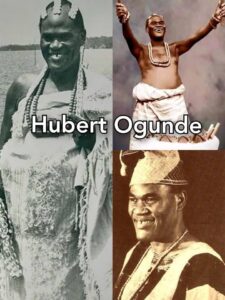
Legacy: Known as the “father of Nigerian theatre,” Hubert Ogunde is one of the most influential figures in the history of Yoruba cinema and Nigerian theater as a whole. He was a trailblazer who transitioned stage plays into film, creating what is known today as the Yoruba film genre. His film Aiye (1979) was one of the first Yoruba movies to gain significant recognition.
Notable Works: Aiye, Jaiyesimi, Kongi’s Harvest
Ogunde’s legacy includes popularizing Yoruba culture through theatre and filmmaking.
2. Moses Olaiya (Baba Sala) (1936–2018)
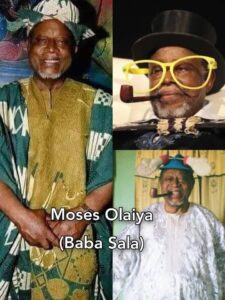
Legacy: Baba Sala was a legendary comedian and filmmaker, often regarded as one of the forefathers of modern Nigerian comedy. His ability to mix comedy with dramatic performances made him a key figure in the development of Yoruba cinema. His films were an excellent blend of humor, social commentary, and deep Yoruba traditions.
Notable Works: Orun Mooru, Baba Sala in London, Sisi Ni Dudu
Baba Sala was also a master of the stage, and his impact on Nigerian comedy and film is still felt today.
3. Adeyemi Afolayan (Ade Love) (1940–1996)
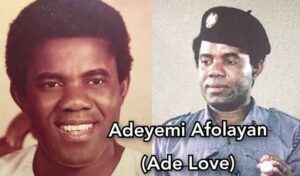
Legacy: Ade Love was a pioneer Yoruba filmmaker whose works helped shape the genre in its early years. His influence is still evident, as he was instrumental in blending Yoruba traditions with cinematic techniques. His films were known for exploring deep themes of love, family, and Yoruba culture.
Notable Works: Taxi Driver, Kadara, Solemn Vow
He is the father of renowned filmmaker Kunle Afolayan, continuing a legacy of excellence in cinema.
4. Ishola Ogunsola (I-Show Pepper) (1939–1992)
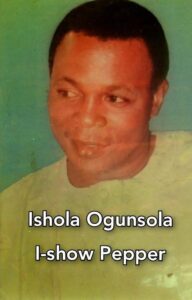
Legacy: I-Show Pepper was another legendary figure whose contributions to Yoruba theater and film cannot be overstated. A popular comedian, actor, and director, Ogunsola’s performances were often larger than life, and his films were a staple in Yoruba cinema for many years.
Notable Works: Ife Mi O, Alade Ogo, Olorun Ayo
His work helped lay the groundwork for the comedic direction in Yoruba films.
5. Oyin Adejobi (1926–2000)
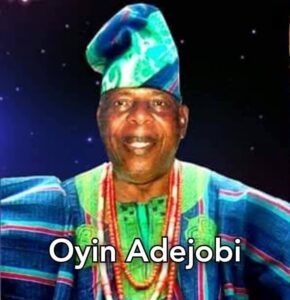
Legacy: Oyin Adejobi was a prominent Yoruba actor and playwright known for his stage productions and involvement in early Yoruba cinema. His films often explored moral and social issues, resonating with audiences across generations.
Notable Works: Ile Afojuba, Mara Miri, Akoda
Adejobi’s contributions to Yoruba drama and cinema cemented his place as one of the genre’s early trailblazers.
6. Adebayo Faleti (1930–2017)
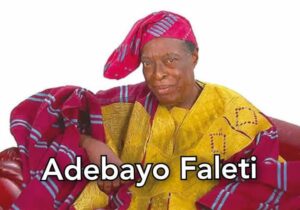
Legacy: Adebayo Faleti was a multi-talented actor, director, writer, and poet. Known for his deep voice and eloquent Yoruba language skills, Faleti was a key figure in early Yoruba film production, contributing significantly as both an actor and a translator. He also played an instrumental role in translating English films into Yoruba, which helped spread the medium to a wider audience.
Notable Works: Afonja, Igba Alago
Faleti’s work in theater, radio, and film made him a beloved figure in Yoruba cinema.
7. Kayode Odumosu (Pa Kasumu) (1950-2020)

Legacy: He was a respected Nigerian actor in the Yoruba film industry. He was born on March 15, 1950, Pa Kasumu was known for his deep voice and remarkable acting skills, contributing significantly to Nigerian cinema. He passed away on March 1, 2020, leaving behind a legacy as a veteran actor in the Yoruba movie sector.
Notable Works: “Abeni,” “Omo Orukan,” and “Ijapa”.
8. Babatunde Omidina (Baba Suwe) (1958 -2021)
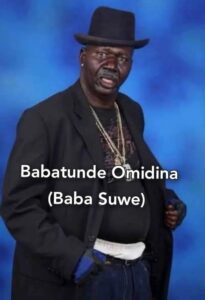
Legacy: He was a renowned Nigerian actor and comedian. Born on August 22, 1958, in Lagos, Nigeria, Baba Suwe became a household name for his exceptional comic roles in Yoruba films. He was celebrated for his ability to entertain audiences with humor and his distinct style of acting.
Baba Suwe featured in several movies, which solidified his status as one of the leading figures in the Yoruba film industry. His comedic performances often depicted the challenges and humor in everyday life, making him loved by fans across Nigeria.
Notable Works: Iru Esin, Baba Londoner, Maradona, Lanriloodu, Obe lomo
9. Funmi Martins (1963-2002)
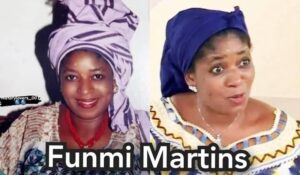
Legacy: was a Nigerian actress and movie producer, best known for her contributions to the Yoruba film industry and became one of the prominent figures in Nollywood before her untimely death. Funmi Martins was admired for her acting skills and was known for her roles in numerous Yoruba films.
Her career spanned several years, and she gained recognition for her ability to portray a wide range of characters, from comedic to dramatic roles. Funmi Martins was also known for her production work and helped shape the direction of Yoruba cinema during the 1990s and early 2000s.
Tragically, Funmi Martins passed away on May 6, 2002, at the age of 39, reportedly due to complications from a heart condition. Despite her short life, her legacy continues to impact the Nigerian film industry, particularly within the Yoruba-speaking segment of Nollywood.
Notable Works: Ailatunse
10. Yekini Ajileye (1953 – 2006)

Legacy: He was a prominent Nigerian actor, director, and producer, known for his contributions to the Yoruba film industry. He has appeared in numerous films, showcasing his versatile acting skills and his ability to portray a wide range of characters. Beyond acting, Ajileye has also made his mark as a director and producer, influencing the growth of Yoruba cinema. His works often explore cultural themes, societal issues, and family dynamics, helping to preserve and promote Yoruba traditions through film. Ajileye continues to inspire aspiring actors and filmmakers in the Nigerian movie industry.
Notable Works: Koto orun, Koto Aye, Eran iya Oshogbo, Buharimo omo orukan
These late pioneers and veterans of Yoruba cinema were key figures who helped establish and define the genre. Their works remain a foundational part of the industry, with their influence still visible in the works of modern-day Yoruba filmmakers and actors.
11.Lukuluku Bantashi
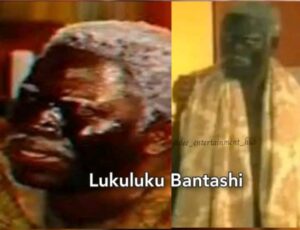
A prominent Nigerian comedian and actor in the Yoruba movie industry during the 1980s and 1990s. Renowned for his unique comedic style, he often portrayed humorous characters with distinctive costumes, including oversized mismatched clothing and a face painted with charcoal black. His performances were marked by a signature comical crying style that endeared him to audiences.
Throughout his career, Lukuluku featured in numerous popular Yoruba films, such as “Yemi My Lover,” “Ti Oluwa Nílẹ,” “Imulẹ Ìfẹ,” “Legal Wife,” “Ami Orun,” and “Itunu.” His presence was highly sought after by movie producers, making him a prominent figure in the industry during his time.
Tragically, Lukuluku Bantashi passed away in 1995, leaving a significant void in the Nigerian entertainment scene. His death was widely mourned, and his unique brand of comedy remains unmatched to this day.
12. Modupe Tomori,
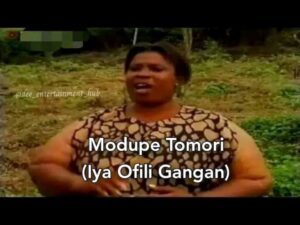
Popularly known as “Iya Ofili Ganga,” was a renowned Yoruba actress celebrated for her significant contributions to the Nigerian film industry. She passed away in February 2011 at her residence in Osogbo, Osun State, after complaining of a headache. Her death was considered a substantial loss to the entertainment community, with colleagues and fans mourning her departure. She was laid to rest in Osogbo, and her legacy continues to be remembered by many.
13. Rebecca Adebimpe Adekola (Ireti)
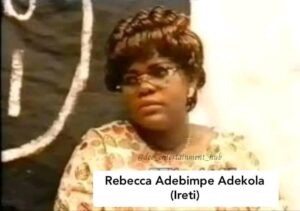
One Nigerian Actress That Should Not Be Forgotten In The HISTORY Of Nollywood Film Industry. Ireti was born in Abeokuta, Ogun State, where she also grew up. She was a producer, film writer, director and an outstanding actress. Ireti was known for starring in many flicks alongside Taiwo Hassan aka Ogogo Omokulodo, also one of Nigeria’s most well-known actors in the Yoruba genre of Nollywood.
In 1993, Jide Kosoko released a movie titled Asiri Nla and in it, she acted the role of Ireti, and that was how the name stuck.
Rebecca Adebimpe Adekola died after a brief illness due to some complications suspected to be from typhoid fever. She gave up the ghost at Unity Hospital, a private medical center in Surulere, Lagos State on Friday 27th September, 2002.
In October 2012, ten years after she died, the National Association of Nigerian Theatre Arts Practitioners (NANTAP) decided to launch the Ireti Adekola Foundation (IAF) at the National Theatre, Iganmu, Lagos to immortalize her name. The foundation was established to take care of single mothers and mentor upcoming and talented actors and actresses.Notable Works:-IKE OWO-AGBA AKIN-OLAONIRAN-23/24 LORO ILE AYE-AYE AWA OBINRIN (the last movie she appeared in before her demise)
ALAMU S’ENIYAN-ENIKAN O LAYE-EDUNJOBI (brought her to limelight)-AFINJU ALAPATA
-SIKIRA EREKO.
14. Kola Ogunmola (1925–1973)
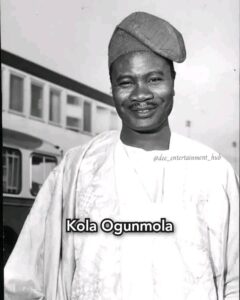
A renowned Nigerian playwright, actor, and theater pioneer who played a significant role in the development of Yoruba theater. He was known for adapting traditional Yoruba folktales and societal themes into stage performances, blending drama with music and dance.
One of his most famous works was “The Palm-Wine Drinkard,” an adaptation of Amos Tutuola’s novel, which he brought to life on stage with his unique style of storytelling. Ogunmola’s productions often explored moral lessons, cultural values, and the human condition.
He also founded the Ogunmola Theatre Group, through which he trained many actors who later became prominent in Nigerian theater and film. His legacy is celebrated for its impact on the evolution of Yoruba drama and its influence on the broader Nigerian performing arts scene.
Notable Works:
1. Omo Oloja”– A popular Yoruba film in which Kola Ogunmola delivered a memorable performance.
2. “Ijéle” – A Yoruba drama movie that also features Ogunmola in a key role.
3. “Olokiki Oru” – A film that blends traditional Yoruba culture with captivating storytelling.
4. “Ija Ominira” – Known for its action and drama, Kola Ogunmola’s performance in this movie received significant attention.
5. “Asewo To Re Mecca” – A Yoruba comedy-drama where Ogunmola brought his usual flair to the screen.
– “Omo Alhaja” – A movie produced and starred in by Kola Ogunmola that received attention in the Yoruba movie industry.
– “Obinrin Oko Mi” – Another film produced by Ogunmola, which features typical Yoruba themes and drama.
Kola Ogunmola is celebrated for his exceptional acting skills, often playing roles that explore themes of Yoruba culture, traditions, and family dynamics. While his portfolio as a producer may not be as extensive as his acting career, he remains influential in the Yoruba film sector.
15. Yomi Ogunmola
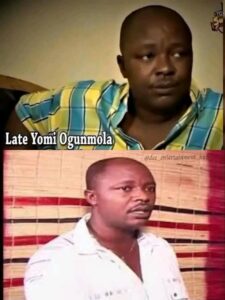
A talented Nigerian actor, filmmaker, and director who gained prominence in the Yoruba film industry. Known for his exceptional acting and storytelling, he was celebrated for his ability to portray diverse characters with authenticity. Some of his notable works include “Bata Wahala” and “Ayo Ni Mo Fe.
Yomi Ogunmola was also a skilled scriptwriter and producer, contributing significantly to the growth of Nollywood, particularly in Yoruba cinema. Tragically, he passed away in 2003, leaving behind a legacy of memorable performances and impactful contributions to the Nigerian entertainment industry.
16. Ahmed Durojaiye (Alasari) (1965 – 2011)

He was a prominent Yoruba actor and producer in Nigeria. Born in 1965, he gained fame for his roles in movies such as “Oyin Tokoro” (2005) and “Ologbo Iya Ijebu” (2007).
Tragically, Alasari passed away on March 20, 2011, following a fatal car accident on the Lagos-Abeokuta expressway. He was en route to promote his new movie, “Omo Night Club,” when the accident occurred.
His death was a significant loss to the Yoruba movie industry, where he was regarded as one of the contemporary A-list actors.
In remembrance of his contributions, various tributes have been shared, including a notable performance featuring Mr. Latin (Bolaji Amusan) in “Kunle Alajeseku.”
Alasari’s legacy continues to be celebrated by fans and colleagues in the Nigerian film industry.
17. Alade Aromire (1959–2008)

A pioneering Nigerian filmmaker, actor, and producer who played a significant role in the evolution of the Yoruba film industry and Nollywood. He is credited with being one of the first filmmakers to produce a Yoruba-language home video, marking the transition from celluloid to video production in Nigeria. His contributions helped popularize the home video format, which became a cornerstone of Nollywood’s success.
Aromire produced, directed, and starred in numerous Yoruba films, many of which highlighted traditional values and addressed societal issues. He was also a media entrepreneur, owning a television channel and a radio station. Aromire’s legacy is his groundbreaking work in establishing the modern Nollywood industry and promoting Yoruba culture through film.
Notable Works:
Ekun Oko Oke, Aromire, Fopomoyo, Agbara Ife, Omo Ologo
These films often explored themes of love, betrayal, tradition, and morality, reflecting Yoruba cultural values and addressing societal issues. Aromire’s innovative approach to filmmaking helped shape the home video market in Nigeria.
18. Christopher Akintola Ogungbe (Akin Ogungbe) (1934–2012)
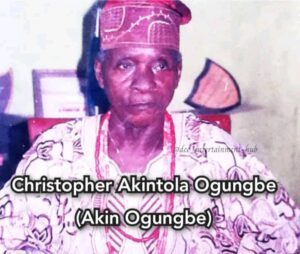
A renowned Nigerian actor, filmmaker, and pioneer in the Yoruba film industry. He was a prominent figure in the development of stage and cinematic storytelling in Nigeria. Ogungbe began his career in the theater and was known for his powerful performances and cultural storytelling. He founded the Akin Ogungbe Theatre Group, which trained many actors who later became prominent in the Yoruba film industry.
He featured in and directed several iconic Yoruba films and is often celebrated for his role in promoting traditional Yoruba culture through his art. Ogungbe was also the uncle of popular Nigerian actor and filmmaker Jide Kosoko. His work remains influential in the Nigerian entertainment industry.
1. Ireke Onibudo – A timeless tale of love, betrayal, and redemption.
2. Aye Ode – A story exploring human greed and its consequences.
3. Olowo Laye Mo – A drama about the pursuit of wealth and its impact on relationships.
4. Ekuro Oloja – A film centered around community dynamics and societal challenges.
5. Koseegbe – A cautionary tale about life’s moral lessons.
These movies often depicted Yoruba cultural traditions and values while addressing universal human experiences.
19. Durodola Durosomo Duroorike Timothy Adisa Ladipo (Duro Ladipo) (1926– 1978)
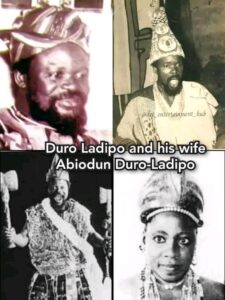
A renowned Nigerian playwright, actor, and musician, celebrated for his contributions to Yoruba theater and cultural preservation. Born in Osogbo, he is best known for his iconic plays rooted in Yoruba mythology, such as Oba Koso, Moremi, and Ogun Laye. These works skillfully combined traditional Yoruba music, dance, and drama to tell compelling stories.
Ladipo was a pioneer in adapting Yoruba folk tales for the stage, earning both local and international acclaim. He founded the Mbari Mbayo Club in Osogbo, a hub for African artists and intellectuals. His efforts significantly influenced the development of modern Nigerian theater and helped preserve Yoruba cultural heritage.
In 1964, he married Abiodun Duro-Ladipo, his third wife, and she became a permanent member of the troupe. She gained fame as an actress, taking main roles in all the plays performed by the company.
Notable works:
1. Oba Koso (The King Did Not Hang) – A play centered on the legendary story of Sango, the Yoruba god of thunder. It has been performed widely and captured in various forms.
2. Moremi – The story of the Yoruba heroine who sacrificed herself for her people; it has influenced both stage productions and adaptations in modern Yoruba films.
3. Ajagun Nla (The Mighty Warrior)– A portrayal of valor and leadership in Yoruba tradition.
4. Eda (The Creation) – A reflective piece on life, destiny, and the human condition.
While there are no direct “movies” credited to Duro Ladipo himself, his works laid the groundwork for many adaptations and inspired storytelling.
FOLLOW US ON:
ADVERTISE WITH US:










